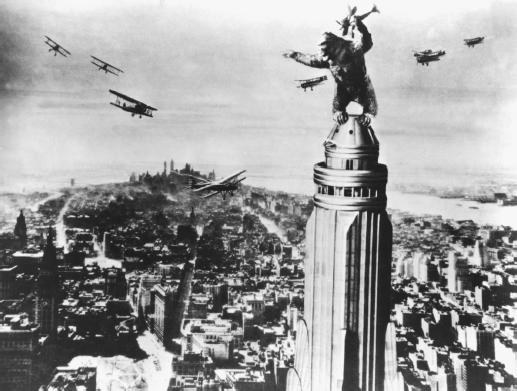...there was a time when some of best-selling authors wrote screen plays from their and others' books. The result was a great improvement in scripts.
I'm afraid you'll have to provide examples to prove your point on this one, because I have always been under the distinct impression that novels work very differently from screenplays, and thus, novelists are very different from screenwriters. It takes someone who knows movies to make a book into one; the author can be too attached to the material to be willing to adapt it for the screen. Of course there are exceptions, but as it stands, not enough to hold your argument up.
And there were veteran actors who used their experience and imagination to turn what was going to be a B-grade movie into a cult favorite.
And are you implying that this phenomenon crumbled along with the studio system? I think it is safe to say that a large majority of the good movies out there wouldn't be quite as good without the support of a 'veteran actor.' Yes,
Taxi Driver was well directed and written, but i dont suppose it would have been better than a B-grade movie if they decided to go with Jeff Bridges, Al Pacino or Neil Friggin Diamond. (All Considered for the role of Travis)
I think the old studio system was better in some ways where they bought up and filmed books and plays, scripts by great playwrites, with contract players who had time to develop their crafts and the character actors who added so much color to those films, and the use of black-and-white film to enhance certain stories. Now everything is about "the deal"--not necessarily the best director and cast, but the hot "names" who are easy to bankroll; not an original script, but a knockoff of a film, TV series, or comic strip that the Baby Boomers might remember.
A Few Good Flicks from 06, All based on Novels:
- The Black Dahlia
- The Devil Wears Prada
- All the King's Men
- Children of Men
- Flags of Our Fathers
- The Good German
- The Last King of Scotland
- A Scanner Darkly
- Zodiac
- Little Children
...And all the emphasis on computer graphics, special effects, added romantic interest, and car chases.
Well computers weren't really in existence until well after the studio system was dead and gone. But I'm sure you're right, those studio filmmakers would have probably turned down the digital help, if they were given the option.

As for special effects, I'll agree with you. You see, special effects were invented by Stephen Spielberg in 1975 for the movie
Jaws. There were no special effects prior to this, though there are many skeptics out there who cite sources as early as
The Great Train Robbery, (1903), which utilized for many of it's prints early forms of hand tinting and color stenciling. Some will also talk all about the early RKO flick
King Kong, (1933), saying it was riddled with what was then considered state of the art special effects like animation and miniatures. The bold will go as far as arguing for
Citizen Kane, (1941), claiming that it's breakthrough use of the optical printer pushed the boundaries of special effects, changing movies forever.
But i assure you, all those people would be wrong, because as you say, special effects are a development of Mr. Spielberg.
...And all the emphasis on computer graphics, special effects, added romantic interest, and car chases.
Romanitc interest was just as prevalent in early film as it is today. If you are noticing any difference, it is simply that filmmakers are allowed to show more under the gratuities of the MPAA in comparison with the Production Code. In other words, your precious Cagney would have probably nailed Mae Clark in
The Public Enemy if it was allowed.
...And all the emphasis on computer graphics, special effects, added romantic interest, and car chases.
By 'car chases,' I will go ahead and assume you are addressing action in general, because i dont think you would be silly enough to argue that car chases were invented as late as
Bonnie and Clyde, (1967), or
Grand Prix just a year earlier.
Check out the chariot race in Enrico Guazzoni's
Quo Vadis?, (1913), or Griffith's work with the horse chase in
Birth of a Nation, (1915) or his climactic chase scene from
Intolerance in 1916. I could go on.
Action is a staple of film spectacle. In many ways, action
is film. I believe that there will always be filmmakers out there who are pushing the absolute limits of what film can do, whether it is building an entire stretch of highway just to blow it up, or using a computer to simulate an explosion in outer space. These kinds of filmmakers have always been around, since 1895 to be sure.
For this reason, there will always be folk hanging around complaining about the current state of film due to a sentimental nostalgia for the way things used to be. In my opinion, filmmakers haven't changed and there isnt really a solid reason to believe so. Technology is the thing that has changed- and the one incredibly unique thing about flim art is that is is directly and indefinitely fused to technology. People will use what is available to them, whether it's stopping the camera to replace a new car with a demolished one, or calling up ILM to do the same thing on a fleet of computers.
We can't stop the advancement of mainstream cinema even if we wanted to. It's link to technology is impossibble to sever, and you could never get a group of artists to stop experimenting.
Your choices? Well i suppose we could keep whining, crying over our collections of Hitchcock and Ford and Capra films, continuously regurgitating whatever nostalgic blather our jaded film professors hand to us,
OR, Sit back and enjoy the ride.




